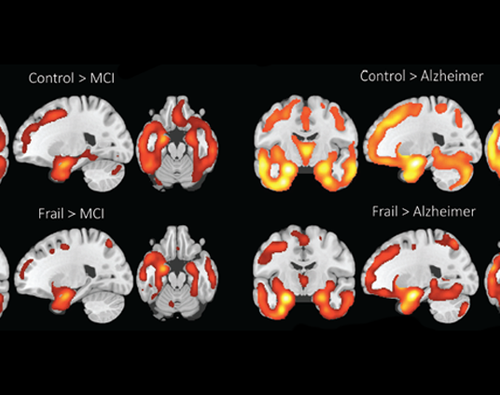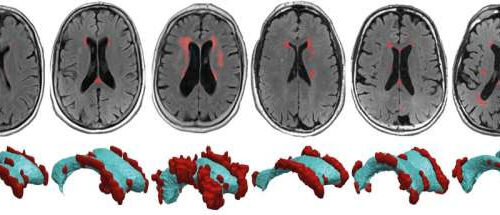by University of Montreal Credit: CC0 Public Domain Physical activity, nutrition and cognitively stimulating activities are all known to be good ways to prevent Alzheimer’s disease and dementia. And older adults at risk can access a variety of lifestyle services to that end, including diet regimes and exercises for their body and mind. Now an...
Tag: <span>Cognitive decline</span>
Cognitive decline not always a sign of Alzheimer’s disease
SOCIETY FOR NEUROSCIENCE IMAGE: THE BRAINS OF THE COGNITVELY FRAIL MORE CLOSELY RESEMBLE THE BRAINS OF HEALTHY CONTROLS THAN THOSE OF ADULTS WITH ALZEHEIMER’S DISEASE OR A MILD COGNITIVE IMPAIRMENT. CREDIT: KOCAGONCU ET AL., JNEUROSCI 2022 At the first sign of cognitive trouble, people often worry Alzheimer’s disease is forthcoming. But poor cognition can be...
What is the Contribution of Demyelination to Cognitive Decline in Aging?
Myelin is an insulator that sheaths the axons forming nervous system connections. It is essential to the correct electrochemical function of the nervous system. Severe conditions such as multiple sclerosis result when myelin is lost, degrading nervous system function to the point of disability and death. In normal aging, myelin is also lost, though to...
Wear and tear in vulnerable brain areas lead to lesions linked to cognitive decline
by Stevens Institute of Technology Lesions (red) occur near areas that must stretch more to accommodate pressure changes of the circulating cerebrospinal fluid. When the walls of the CSF-filled ventricle (black) wear thin, CSF leaks into the brain tissue (grey) and creates lesions. Credit: Stevens Institute of Technology As our brains age, small lesions begin...
Flavonoids Dietary ‘Powerhouses’ for Cognitive Decline Prevention
Megan Brooks Eating at least half a serving per day of foods rich in flavonoids — like strawberries, oranges, peppers, and apples — may help lower the risk of age-related cognitive decline, new research shows. Among the different types of flavonoids, flavones (found in some spices and yellow or orange fruits and vegetables) and anthocyanins...
Fat cells found to play a central role in cognitive decline and neurodegeneration
by Marshall University Joan C. Edwards School of Medicine Credit: Pixabay/CC0 Public Domain Findings published this week reveal new insights into the role of fat cells in cognitive decline and neurodegeneration, according to a study that involves the oxidant amplification loop led by Marshall University scientists. The research, published in iScience, shows that fat cells control...
SLEEP ‘SWEET SPOT’ MAY MEAN LESS COGNITIVE DECLINE
A multiyear study of older adults found that both short and long sleepers experienced greater cognitive decline than people who slept a moderate amount, even when researchers took into account the effects of early Alzheimer’s disease. Poor sleep and Alzheimer’s disease are both associated with cognitive decline, and separating out the effects of each has proven challenging....
APOE E2/E2 Genotype Offers Some Protection from Cognitive Decline
BOSTON UNIVERSITY SCHOOL OF MEDICINE The APOE gene—coding for a protein involved in lipid transport and implicated in the clearance of amyloid-beta, one of the proteins that builds up in the brain in Alzheimer’s disease—exists in three allelic forms: E4, E3, and E2. Researchers have strong evidence that the presence of E4 constitutes a risk factor for...
Biomarker predicts cognitive decline in Alzheimer’s disease
by Marla Paul, Northwestern University Credit: CC0 Public Domain A biomarker in the brain predicts future cognitive decline in patients with the language form of Alzheimer’s disease (AD), reports a new Northwestern Medicine study. Northwestern Medicine scientists discovered the buildup of tau protein in the brain predicts the amount of future cognitive decline over one year...
Diabetes Drugs Tied to Less Amyloid, Slowed Cognitive Decline in Alzheimer’s
Pauline Anderson August 11, 2021 Among patients with cognitive impairment, those with diabetes who took dipeptidyl peptidase-4 (DPP-4) inhibitors had less amyloid-beta (Aβ) in the brain compared to the patients with diabetes who did not take these medications and to the patients without diabetes, new research shows. DPP-4 inhibitors are a class of oral hypoglycemic agents. The...





